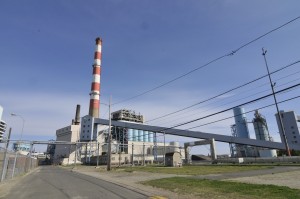Groups push for coal plant shutdown
President Barack Obama”™s recent call to address climate change has renewed efforts to shutter the Bridgeport Harbor Station, a coal-fired power plant.
After years of organizing, the Healthy Connecticut Alliance campaign remains adamant that the power station should be retired, although the owner of the plant contends it”™s still needed as a backup power source.
Previously the station has ranked as the eighth-worst for environmental injustices by the National Association for the Advancement of Colored People, based on emission levels and demographics of where the plant is located.
But it”™s not environmental activism that”™s going to shut down the plant ”” it”™s simple economics, said Jonathan Peress, director of the Conservation Law Foundation”™s division for clean energy and climate change.

“The people in the community have good reason for what they”™re advocating for,” said Peress, an environmental attorney. “What”™s going to shut down the plant though is going to be the economy.”
Both the Conservation Law Foundation and Sierra Club are partner organizations within the Healthy Connecticut Alliance, which is a public advocacy group leading efforts to shut down the Bridgeport Harbor Station.
The foundation is also suing the plant owners for more than 800 alleged Clean Air Act violations within the last five years.
Now the only coal plant in Connecticut, the station is owned by Public Service Electric & Gas Co. (PSE&G). The company is one of the 10 largest electric companies in the U.S. and is headquartered in New Jersey.
“The imminent demise of the plant has been predicted by numerous Wall Street analysts and is apparent by the production and financial results of the plant over the last four years,” Peress said.
PSE&G did not comment on how much coal is burned at the factory or at what capacity the plant operates in relation to its maximum output. However, data show the plant was likely operating at an average 3 percent capacity level in 2012, according to an analysis of U.S. Department of Energy data by the Business Journal.
At that rate, Peress speculated that PSE&G was likely losing millions of dollars by continuing to keep the plant open.
In 2008, the Bridgeport Harbor Station was operating at an average of about 88 percent of its peak capacity. However, as cheap natural gas has become more available it has displaced coal power, which has long been regarded as one of the least expensive means of generating electricity. Notably, PSE&G is also a major player in the natural gas industry.
In 2002, and again in 2008, PSE&G made large investments in emissions control technology at the station. Since then, the company has reduced emissions from mercury and particulate matter by 95 percent, nitrogen oxides by 67 percent and sulfur dioxide by 76 percent.
In 2008 the company spent $150 million on emissions controls. While Peress contends the size of the investment has led PSE&G to keep the plant operational, the company says the plant acts as a backstop for the region”™s electric grid.
“PSEG Power”™s balanced generation portfolio benefits consumers by helping to ensure reliability,” said Lee Gray, a senior communications consultant at PSE&G. “No one can predict the weather and no one can predict what will impact fuel availability.”
Gray said Hurricanes Katrina and Rita badly damaged natural gas pipelines and facilities along the Gulf Coast in 2005, which forced Connecticut and other states to switch to other fuels as they faced restrictions on the supply of natural gas.
“It”™s also important to keep in mind the value of a diverse fuel fleet in Connecticut,” Gray said. “You don”™t have to go too far back into history to see how an event or natural phenomena can have an impact on demand or how electricity is generated.”
However, the Independent System Operator-New England, which regulates the region”™s grid and electric generators, has already identified the plant as one of several that are expected to be retired in the coming years without any negative impact, Peress said. Other sources of power along the grid would take over.
“Broadly speaking, there is a need to replace some of the power plant capacity as it retires, but as a reliability matter, it wouldn”™t cause a problem because it doesn”™t need to be replaced,” Peress said.
Noting that the power station is right next to Bridgeport”™s future Steelpointe Harbor development ”” where a Bass Pro Shops outlet will be located ”” Peress said he believed the site would better serve the community as an extension of the new development.
Onté Johnson, a community organizer for the Sierra Club”™s “Beyond Coal” initiative, agreed.
“We have one of the highest asthma rates and worst air quality in the nation,” Johnson said. “We definitely do not want to be operating a plant using dirty fossil fuels that every time it”™s burned impacts the air that we breathe.”
“Coal is really expensive,” he said. “It”™s not the same competitor it was in the past. We have to come out of our old way of thinking.”